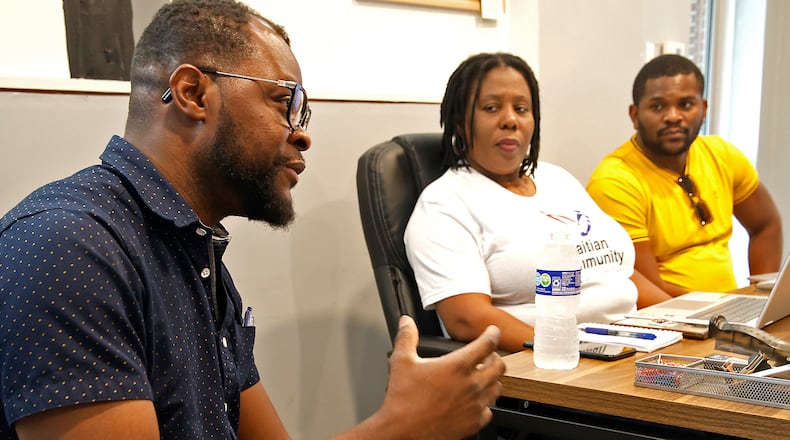Several early speakers voiced frustration with youths on 4-wheelers and mini-bikes destroying public property; car break-ins; vandalism, and what they said was the failure of law enforcement to address such problems. Zoning enforcement, or the lack of it, was also a problem cited by some speakers. Increasing domestic violence data was shared by another.
But, as has been the case at every commission session to date this year, most of the comments focused on concerns related to Haitian immigration.
Richard Jordan expressed frustration, saying, “Haitians who came here with nothing and paid no taxes” are being given money while “other people in our town, veterans, are homeless and not being taken care of … it’s out of control … I don’t understand why Haiti’s problems become our problems.”
When Vilès Dorsainvil, a Haitian pastor and president of the Haitian Community Help and Support Center board in Springfield, spoke and offered some insights into how and why most Haitians arrived in Springfield.
“Haitians are here looking for a place they can be at peace. We are fleeing from violence you can’t imagine. You would not know what it is like to wake up in the morning and not know whether you will live to see the end of the day. You would not understand how it feels to be kidnapped and, despite money being paid for the person to be released, they kill the person anyway. You would not understand how it is to wake up one morning and you cannot feed your kids.”
Then he issued a plea that American citizens “put pressure on the federal government to control the influx of guns going into Haiti … our government is too weak to control those guns” that he said come from the U.S.
He invited people to visit the Haitian Community Help and Support Center, 1530 S. Yellow Springs St., for a conversation to better understand the plight of Haitians and to help ensure that everyone is living in peace in the city.
“We ask that you pray for us, that you pray with us.”
Several speakers asked city leaders to rescind the resolution adopted by city leaders in 2014 declaring Springfield a “Welcoming City” to immigrants. City officials have clarified multiple times Springfield is not a sanctuary city and does work with federal law enforcement to identify and deport undocumented immigrants. However, that designation does not apply to Haitians who have Temporary Protected Status due to the dangerous situation in Haiti.
Nancy Flinchbaugh underscored that point when she spoke.
“The Haitians are here legally, so I’d really like to ask that you don’t call them illegal,” she said.
She also suggested people consider “the reason we have so many immigrants in our country is because the businesses want workers and are hiring them. I believe most of the policy has to do with capitalism in our country. There is no immigration reform because the businesses don’t want that.”
In response to complaints about Springfield being designated as a “Welcoming City,” Flinchbaugh offered some background.
The measure was a nonprofit initiative, she said, not a government program, borne out of circumstances surrounding the last major immigration group that became part of the fabric of the community.
“I watched when our Latin American neighbors first moved into the city and the county, working jobs our people did not want to do. They had very little protection. They were taken advantage of by employers and others, and they were the reason that Welcome Springfield was started,” Flinchbaugh said. “They didn’t come to commit crimes. In fact they were often easy targets and became victims of crime. They came because they couldn’t feed their families in Mexico or Latin America — the same reasons that my ancestors and some of yours came from Europe.”
The comments came the same meeting in which Clark County Combined Health District Commission Chris Cook offered a presentation about health care related to Haitian immigrants.
Steve Schlather thanked Cook for his “fact-based” presentation and pointed out that while the situation is challenging “it is not constructive to demonize people or spread baseless conspiracy theories about how this happened. It’s more constructive to work with people and try to help them integrate into the community. I know some Haitians, and they are hard-working and want to make a contribution.”
Mayor Rob Rue and City Manager Bryan Heck were chastised by some speakers for engaging in an interview with Fox News.
Mary Jo Groves told them she was disturbed to see their appearance “on a frankly partisan news channel ... I would be just as upset if you had been on MSNBC. As far as I can see it did not accomplish one positive thing for our community and contributed to the divisiveness … I expect our civic leaders to be leaders in civic friendship and exemplify how we agree.”
She also urged city leaders to work with state government to address the need for additional financial support to bolster safety forces, healthcare and social services as a result of the unanticipated increase in city residents.
Groves said: “The state has been taking $1 billion a year from municipalities like ours since 2012 … we were getting 3.6% from the General Fund then and we’re getting 1.6% now. Why are you guys not banging the Statehouse doors down to get Mike DeWine and our Republican legislature to give us back our money?”
When the comment period ended and commissioners started the business portion of official proceedings most of those in attendance exited, leaving only nine people remaining who were not members of city staff to observe official actions taken.
About the Author
